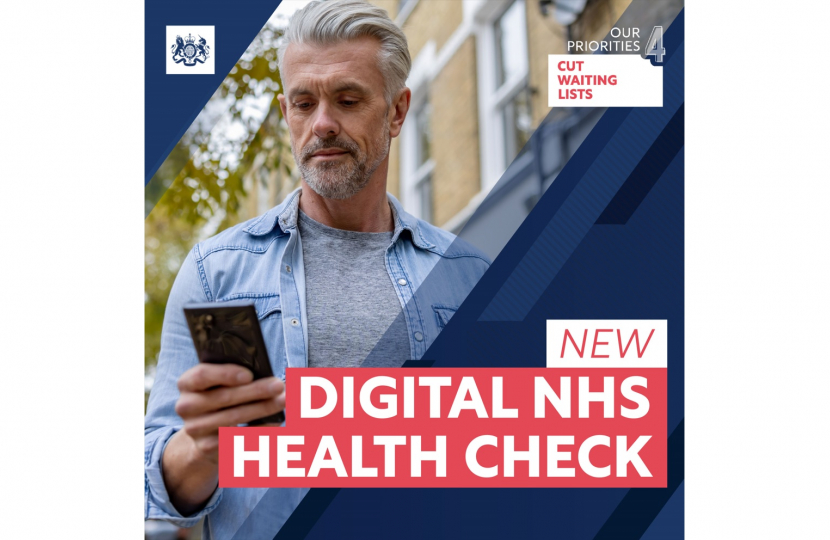
Henry Smith MP has welcomed the Government’s announcement that it will deliver one million checks across England from next spring.
The current NHS Health Check has helped to prevent heart attacks and strokes and is currently a face-to-face check-up for adults in England over 40 to 74. Commissioned by local authorities and largely delivered through GP surgeries, it can help spot stroke, kidney disease and type 2 diabetes.
Around 1.3 million health checks are delivered each year, identifying 315,000 people living with obesity and 33,000 cases of hypertension, and preventing over 400 heart attacks and strokes.
From spring 2024 the new digital check will operate alongside the existing in-person NHS Health Check – and is expected to deliver an additional one million checks over four years, while easing pressure on GP surgeries.
Henry said;
“I commend the Government and the NHS for confirming that Digital NHS Health Checks will be rolled out throughout England next spring with an additional one million checks in the first four years delivered.
“It’s expected that tens of thousands of cases of hypertension will be identified and hundreds of strokes and heart attacks could be prevented.
“There are immense possibilities for the NHS to utilise new technologies and as we mark the 75th anniversary of the founding of the National Health Service this week, it’s vital that technological advances are used as the NHS looks ahead to the next three quarters of a century.”
Cardiovascular disease is the second biggest killer in England and affects around 6.4 million people. The new digital check will help to identify 200,000 people who could benefit from the use of statins, 30,000 cases of hypertension – persistently high blood pressure – and prevent around 400 heart attacks and strokes over the first four years.
Each digital check could save an estimated 20 minutes of NHS time – freeing up hundreds of thousands of appointments in primary care and helping cut NHS waiting times.
Patients will be able to access the digital health check via a mobile phone, tablet or computer. They will complete an online questionnaire, enter height, weight and blood pressure measurements, and the results of a blood test.
The results will be available online and direct people to personalised advice to reduce the risk of a heart attack or stroke, as well as advice to stop smoking and weight management support where appropriate. Referrals to GPs will only be made if further tests and treatment are needed – helping to reduce demand on GP services.
The Secretary of State for Health & Social Care, Steve Barclay, commented;
“Thousands of heart attacks and strokes could be prevented every year through simple health checks, which would save lives and ease pressure on the NHS.
“This new digital check-up will mean people can do simple tests and get tailored advice from homes while reducing pressure on GP services.
“This programme is the latest example of how we are using technology to cut waiting times, one of the government’s five priorities, improve diagnosis and treatment.”
The Medical Director at the British Heart Foundation, Professor Sir Nilesh Samani, said;
“Millions of people in England are living with conditions like high blood pressure and high cholesterol that, if left untreated, significantly increase the risk of a potentially deadly heart attack or stroke.
“This initiative will help to reach more people and encourage them to get their blood pressure and cholesterol levels checked so that, where necessary, healthcare professionals can work with them to manage their condition.
“This could play an important role in helping people live healthier for longer and saving lives in the coming years, while reducing pressure on the NHS.”
The Chief Executive of the Stroke Association, Juliet Bouverie OBE, commented;
“Stroke is a leading cause of adult disability and one of the biggest killers. We welcome this new digital means of checking and managing your risk of stroke, alongside the option of in-person NHS Health Checks.
“High blood pressure contributes to around half of all strokes, and 500,000 people are living with undiagnosed atrial fibrillation – both conditions that are treatable.
“Blood pressure checks and pulse checks are essential parts of the NHS Health Check, to accurately detect, treat and manage stroke risk in those age 40 to 74, and stop these conditions leading to a life-changing stroke.”


